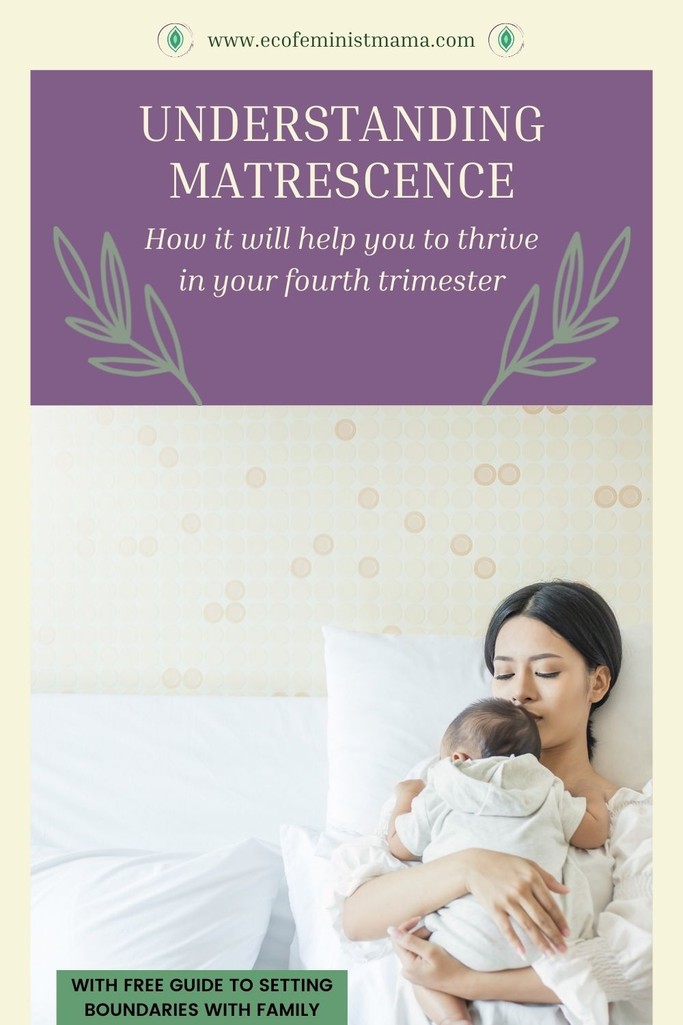When you turn to the internet to find out about life as a new mum, you may have noticed that pretty much everything focuses on physical recovery: a Pinterest search for “postpartum” yields plenty of information about “bouncing back” to your pre-pregnancy body, how to lose the “mum tum” and heal a diastasis recti, natural remedies for postpartum hair loss and ideas for postpartum outfits and meal plans. That’s all well and good – there are plenty of physical things to recover from after birth. But what about the emotional and psychological aspects of becoming a mother? I’m not talking about postpartum depression, although that can happen too of course. What I’m talking about is something that happens to every woman who becomes a mother: matrescence.
Table of Contents
- What does ‘matrescence’ mean?
- Who coined the term ‘matresence’?
- What is the transition to motherhood?
- My experience of matrescence
- How having a baby changed me
- Seeing the world differently
- How the world sees you
- What is mothering and how is it different from motherhood?
- How can you thrive, not just survive your matrescence?
What does ‘matrescence’ mean?
When a baby is born, so is a mother.
There is so much focus and emphasis on welcoming your new little baby into the world that we often forget that there is a whole other life that has been born – that of a mother, whose old life as a non-mothering woman has just ended.
Just as ‘adolescence’ refers to the transition phase we all go through when we leave childhood and begin to enter adulthood, so the term matrescence refers to a transition space where a woman undergoes her transformation into a mother.
Who coined the term ‘matresence’?
The term ‘matrescence’ was coined by American anthropologist Dana Raphael (who also coined the term ‘doula’). Raphael wrote:
“Childbirth brings about a series of very dramatic changes in the new mother’s physical being, in her emotional life, in her status within the group, even in her own female identity. I distinguish this period of transition from others by terming it matrescence, to emphasise the mother and focus on her new lifestyle…”
DANA RAPHAEL, MATRESCENCE, BECOMING A MOTHER, A NEW/OLD RITE DE PASSAGE (1975)
Interestingly, she was also clear that the act of giving birth to a child was not the specific moment that creates a mother, stating that: “…matrescence [is] the time of mother-becoming. Giving birth does not automatically make a mother out of a woman”
So the period of matrescence is an intense transitional space during which a woman becomes a mother. The term is not in the medical dictionary and yet it is the most crucial time of a mother’s life. One that can be fraught with emotional turmoil and struggle, especially if it is not approached intentionally.
What is the transition to motherhood?
The transition into motherhood looks like as many different experiences as there are mothers in the world. There are some key experiences that seem to be inherent to the process, though.
Dr. Alexandra Sacks, who recorded a hugely popular TED Talk on matrescence, identified the mothers in her practice as experiencing emotional turmoil in the following areas:
Changing family dynamics – having a baby creates a new family unit and therefore ignites change in the previous family dynamic. This change can often cause tension, for example with the mother’s parents who may struggle not to interfere with or criticise how the new mother looks after her baby.
Ambivalence – many mothers report feeling torn between an instinctive, primal desire to want to keep their baby close at all times whilst simultaneously wanting to reclaim their own space and time away from them.
Fantasy vs. reality – the reality of taking care of the baby you have carried in your body for so long rarely lives up to the fantasy you held in your head about what it would be like. This crashing down to Earth and the day-to-day hardship, monotony and thanklessness of mothering a newborn baby can be brutal.
Guilt and shame – related to the fantasies we held before having a baby is our desire to be a “perfect” mother, or at least a particular kind of mother we built up to be the ideal. When we can’t live up to this fantasy (and we never can), we feel guilt and shame about not being “good enough”. Guilt and shame can also arise when we have moments of yearning for our pre-baby lives, having to put our own needs first at times, or having taboo or intrusive thoughts such as hurting or abandoning the baby.
My experience of matrescence
For me personally, I experienced tension in all of the areas above. Most of all, though, my experience of matrescence was a deep sense of sadness and resentment over the loss of my previous life.
I could no longer accept a last-minute invitation to the pub, if I ever got one which was rare. My previous friends gradually stopped texting and I felt forgotten. I didn’t have time or energy to do my make up or get dressed nicely. My now-saggy maternity clothes were constantly covered in milk spit up, the flat looked like a bomb site that I felt entirely responsible for, and to top it all my husband’s life stayed pretty much exactly the same.
He got to go out and play music (he’s a professional musician), have a beer with his friends after a gig, work on his composition projects, go to his school job to teach and conversations with other adults. Meanwhile I found myself thrust into the awkward world of baby groups in chilly church halls, blearily trying to make new friends when all you have in common is a baby.
My main heartache through matrescence was that I missed the “pre-baby me”. It wasn’t that I didn’t want the baby – I loved her fiercely with an all-consuming love I’d never known before. But I was mourning the loss of my previous identity and I didn’t know how or even if it would ever come back.
Meanwhile, I had no-one to talk to who could understand. My husband didn’t get it. My and family were all wrapped up in cooing over the adorable baby and keeping the conversation firmly on her. When I mentioned my feelings to the health visitor she quickly bombarded me with questions from a standard form, asked me how to rate my feelings on a scale of 1-5, added up the points and declared that I had postnatal depression. She then sent the form off to my GP who contacted me with a prescription for antidepressants despite not having spoken to me in person. I refused them and wrote a stiffly worded complaint to the GP and health service.
It wasn’t postnatal depression – I was just struggling with the process of becoming a mother, but I didn’t have the language to explain it.
I wish I had known then that I was in the period of matrescence and that I was not alone in feeling these feelings. When you’re in the thick of it, the transition to motherhood is a very lonely one, but every mother you know has gone through (or is going through) the same process.
How having a baby changed me
There are so many changes that go on during this raw transition time of matrescence.
For one thing, it’s all infused with a huge amount of hormonal fluctuation and the sleep deprivation that comes with mothering a newborn. Meanwhile, the joyful attention and focus that was on the mother during pregnancy now shifts to the baby, often leaving the mother feeling forgotten and guilty for feeling that way.
This was also a source of heartache for me: I struggled with the fact that I was no longer “special” as a pregnant woman and was now “just another mum”, bleary-eyed and stressed, struggling with the new skill of steering a pram but invisible to those rushing around me on the busy streets of East London.
I could never relax in those early months. I was constantly in a state of high-anxiety whenever I left the house: did I have enough nappies? Would I be able to find a changing room when I needed one? What if my baby needed feeding when I was on the bus? Am I late for the baby class? Do I really have to go to baby classes?!
And worse, lots of catastrophising: What if we get mugged? What if a speeding car knocks us over when we cross the street? What if someone tries to steal my baby?!
These anxieties calmed down over time, but becoming a HUGE worrier was one of the biggest changes for me.
Seeing the world differently
I think the biggest way in which having a baby changed me is that I suddenly started to see the world differently, in a way I would never have expected.
Television shows where tragic things happened to mothers and/or children took on a whole new personal meaning and I couldn’t bear to watch them. I still can’t, three years later. My emotions are generally much closer to the surface and I’m much more easily moved by stories about families.
I have more tolerance and patience with other children, as I can now see them as someone else’s precious baby just like Ursula is to me.
In short, I once I became a mother started to see every single person in the world as having been somebody’s baby.
So the news of someone like Sarah Everard’s heartbreaking abduction and murder was not only shocking to me for the same reasons it would have done before I became a mother. It happened near where I used to live, in a city that I had often walked alone at night with the fears of that exact thing happening to me so, pre-motherhood, the story would have resonated with me for that reason alone.
But now I can also instinctively feel the kind of indescribable pain her mother must be going through having lost her daughter in that way. It is no longer a case of, “I can only imagine what that feels like”. It is “I can imagine exactly what that feels like because she was your beloved, and my heart breaks with and for you”.
How the world sees you
Meanwhile, we’re expected to act as if nothing is changing. Or if there is an acknowledgement that becoming a mother changes you, it’s that it gives you a saggy tummy and mild incontinence, so here are some exercises to fix that. In my research for this blog I even came across an article on what postpartum abs and core repair exercises you can do before your 6 week medical checkup – so there’s pressure out there to start getting your body to look like one that hasn’t given birth before you’ve even had the all-clear to exercises after actually giving birth 😨
Bounce back. Get back to work. Mother as if you are the woman you were before you were a mother. Work as if you aren’t a mother and mother as if you don’t do any other work. Don’t complain, don’t hold your baby too much, but also make sure you enjoy minute because it goes so fast.
Anything pointing to a deeper and more complex experience of what it’s like to become a mother is ignored in our cultural narrative. So when we feel it, we keep it to ourselves thinking it’s just us.
What is mothering and how is it different from motherhood?
Before I wrap up with some ideas about how to embrace and thrive in matrescence, I want to spend a moment talking about the difference between mothering and motherhood. This distinction is something I feel is vital in understanding some of the challenges we face during our matrescence.
‘Mothering‘ is the term for describing the acts, duties and deeds you undertake and perform as a mother: nursing your baby, changing their nappies, bathing and dressing them, singing them lullabies and so on.
‘Motherhood‘ is the cultural construction that surrounds us as mothers: the social institution of what it means to be a mother that actually doesn’t have anything to do with us as individuals or the way in which we perform our mothering. Motherhood looks and sounds like the ‘frazzled mum’ trope, the mother-as-martyr stereotype, the squeaky clean soccer mom in the USA or the UK equivalent, the ‘yummy mummy’ i.e. images of perfection that we can’t possibly live up to. It is also the more subtle aspects of living as a mother such as the fact that domestic duties seem to get mostly landed with the mother even though they aren’t directly part of mothering, or that a mother is more likely to earn less after becoming a parent than a father is.
Part of what makes matrescence so challenging is that we are not only thrown into the very visceral world of mothering, with all its leaky nipples, sleep deprivation, 2am bottle sterilising, 5pm colicky Witching Hour and endless sleep regressions. We also find ourselves being thrust into the stifling institution of motherhood.
Not only does this happen without our consent and clear intention, it happens without us even noticing. All of a sudden we wake up to find ourselves inhabiting a world we didn’t even fully comprehend existed, let alone decided we wanted to live in.
In Of Woman Born, Adrienne Rich pointed out that what makes ‘motherhood’ as an institution so infuriating is the fact that, unlike other institutions such as the church or the government, there is no point of contact to complain to. So not only are we suddenly placed into a controlling and oppressive social institution, we don’t even have a focal point of that institution to hold accountable for our experiences of it.
For many of us, we love or at least are primally driven to do the hard work of mothering. It’s the baggage that comes with the social construct of motherhood that is where we want to stop the world and get off. This is where guilt and shame often rears its head. We believe we’re not good, natural or instinctive mothers or that we’re doing it wrong, when really the problem is not to do with our mothering. The problem is, we are butting up against the institution of motherhood.
How can you thrive, not just survive your matrescence?
If you are currently going through, or preparing yourself to enter into matrescence, I want to give you some tips for how you can thrive throughout this time. These tips are based on what I feel would have helped me if I had known what I do about both matrescence and the mothering experience.
Talk and/or write about your experience
As I mentioned before, the fact that we’re not talking about our experiences is only making it a lonelier and more stifling one. Share your feelings about being a mother with your partner, parents and (most importantly) other mothers who are also going through matrescence.
When I went to baby groups with Ursula as a newborn, there was plenty of talk about breastfeeding struggles, sleep patterns and other practical issues relating to the baby. But not one single person talked about how they were feeling becoming a mother for the first time. It’s time to normalise those conversations.
If like me you’re not a big “sharer” and struggle to articulate your feelings in person, maybe consider starting a blog to talk about your experiences. It could be entirely private or perhaps become a new sense of purpose, like this blog has for me. Starting a blog (with the help of Suzi at StartAMomBlog.com*) has not only helped me to process and take ownership of my mothering experiences, it helps other mums in their journey as well which is an amazing feeling.
Intentionally preserve some of your identity
I want to be very clear here that I do NOT want to give you yet another thing you feel you have to do as a new mother. I know (believe me) how much you have/will have on your plate as a new mother and I don’t want to lazily throw around phrases like “self care” at you like you don’t already know you would benefit from a moment to yourself.
However, I invite you to try and find time in the day, whenever is the most convenient (or least inconvenient, more like it!) to intentionally do something that makes YOU feel like YOU. I can’t know what that looks like for you but I’ll rattle off a quick list of what that would like for me:
- Do my winged eye-liner in the way I used to do every day
- Watch some ballet performances on YouTube
- Sing a song I love that means something to me
- Spray my favourite perfume
- Dance
- Listen to my favourite music from my childhood
None of these things has to take very long and most can be done with a baby feeding or napping on me.
Make a list of things that make you feel like you to draw on when you need it. However, please avoid anything to do with drinking alcohol or eating when not hungry. I hate to be a party-pooper but, while consuming your favourite drink or snack might seem like and identity-boosting activity, it has the potential to spiral downwards into emotional eating or alcohol dependence if you are struggling with your emotional and mental wellbeing.
If you feel any guilt about any of this, remember: when you intentionally reserve a separate identity for yourself away from your new identity as a mother, you support your child in developing their own identity too.
Respect and care for your body
Our bodies change hugely during and after pregnancy, which is one of many aspects of matrescence that make us struggle to feel like ourselves.
I’m not going to tell you to start working on getting back to your pre-pregnancy body. I honestly think that’s a fool’s errand that will only cause you stress and anxiety. Yours is a body that has given birth now. That’s the reality – embrace, cherish and give thanks for it. Plenty of women find themselves unable to birth. Every single baby born is the result of nothing short of a miracle of remarkable biological coincidences slotting into place despite ridiculous odds against it happening at all. So let’s say this loud:
YOUR 👏 BODY 👏 IS 👏 A 👏 BADASS 👏
If you’re stressing out about trying to get your former body back, I give you full permission to let go of that and not worry about it. Listen to what your body needs – it’s unlikely to need a punishing fitness regime and restrictive diet to get through the matrescence period.
Likewise, if matrescence has been taking its toll on your emotional state and you haven’t moved your body or eaten any whole foods for a while, again listen to your body and ask what it needs.
Whether you need to relax and let your body reconfigure after birth, or it’s time for you to get up and do some light stretches and eat something wholesome, do what you need to do to respect and care for your body.
Take your time
As I mentioned earlier, postpartum advice is often about trying to return to your former self and some kind of state of order. Our society can’t cope with states of chaos and, let’s face it, the fourth trimester (the first 12 weeks after birth) is nothing if not a state of sheer chaos.
In the midst of this chaos, we’re often surrounded by well-meaning people giving us tips on how to get into a routine or schedule, how to get back to work, how to get back in shape, how to fix our pelvic floors. When I was searching on Canva for “postpartum” to find pictures for this post, I was bombarded by photos like this:
So important is the requirement to “bounce back” you need to have a flat stomach and be working out with a baby on your lap! Don’t forget the serene smile, too. This is the “postpartum experience” according to Canva 🙄
Anyway, I’m here to give you permission to TAKE YOUR TIME. Do this at YOUR pace. Not your health visitor’s, your parents’ or that Instagram mum you follow who seems to have her shit together quicker than you (she probably doesn’t by the way…)
Take the time to do what you need to do in order to adjust to your new role. This is the biggest transformation of self you’ve gone through so far in your life. You don’t have to figure it all out at once.
Get good at saying ‘no’
This is hard because we’re often physically and emotionally depleted during this period. But it’s important that you get good at saying ‘no’ to things that are stressing you out and making your matrescence harder.
Great ways to say ‘no’ include:
- No, I don’t want to
- Thanks, I’m all set
- No, I don’t have space for that
- I’m not going to do that
- No, that doesn’t work for me
- That’s not what I want to do
- No, I don’t have capacity right now
- I can’t commit to that right now
- No thank you
- I need to step back from taking on more than I can handle
- No, I don’t feel comfortable with that
- That’s not the right fit for me
- Not right now
- Thank you for your suggestion, but I’m choosing another option
If matrescence is partly stressful because you are having boundary issues with friends and family, then check out my guide to setting boundaries after having a baby. It has a free workbook to go through to help you personalise the boundaries you need to set, as well as scripting advice to help you find the words you need to enforce them.
Get good at saying ‘yes’
On the flip side of the coin, make sure you are good at saying ‘yes’ when people offer you much-needed help and support.
The other week I was at a train station with my 3 year old daughter and the lift was out of order. I had to get her, the buggy and the many many bags of crap that come with travelling with a child up several steps. Meanwhile, a lady behind me had a 3 year old AND a newborn baby in a heavy-looking pram. The station guard offered to help me as he saw me first.
I saw the other lady and said, “Please don’t worry, help her instead – my daughter can climb the stairs just fine and the buggy isn’t heavy”. The other mum tried to insist that the guard help me first. There was a very British, “No after you”/”No after you” thing for a while before I just said very strongly, “Seriously, your hands are fuller than mine. Take the help” and went ahead up the stairs. She was very grateful but I did slightly want to shake her and yell, “You‘ve got two kids including a newborn – just say yes to the help, woman!!“
In fairness, I was a bit like that when Ursula was born. I can’t believe I actually did this, but I turned down the only one of our newborn visitors to actually offer to help with some household chores – “Oh no, don’t worry, we can sort it thank you”. Why?! Why did I do that?? My husband had broken both his arms in a cycling accident just days before our daughter was born and literally couldn’t even pick her up – we needed all the help we could get!! I think it was me trying to be the perfect mother or proving that I was still capable of doing it all or something, I don’t know.
Anyway. Next time someone offers you something that would make your life a little (or a lot) easier, SAY YES TO THE HELP, WOMAN!
Relax into the season you’re in
And finally, now that you have a name for what it is you are/will be going through, do your best to relax into this season of your life. Accept it for what it is – a challenging season that will come and go. When I say “relax into the season” I mean things like:
- Have a think about what positive lessons and experiences this challenging season can bring you. Maybe your identity crisis can reveal aspects of your old identity that no longer serve you. Perhaps it’s a good opportunity to look after yourself more than you usually do.
- Let go of the mess in your house. Accept that you don’t have a tidy house right now and that you will someday. If trying to keep it tidy is stressing you out, stop trying to tidy it.
- Don’t sweat the small stuff. Easier said than done, but ask yourself what small things you could just let go of.
- Relax into the season in your part of the world. If it’s summer, embrace the sunshine and go dip your toes in a river. If it’s autumn, enjoy a peaceful walk in the crunchy leaver. For winter, ask friends and family to bring over mulled drinks and mince pies. If it’s spring, the springtime is traditionally the time of birth and rebirth so this season is perfect for you. Get out in nature and try to connect with the new life springing up all around you.
- Remember that being a “good enough” mother for just 70% of the time is brilliant. I tied myself up in so many knots trying to be perfect at everything all the time. It was exhausting. If I could go back in time, I would have given myself a break and recognised that I was on a learning journey.
I hope this blog has helped you to either make sense of your own matrescence experience, or prepared you for what’s to come.
If you take anything useful away from this I hope it is this: you can use this huge, transformational change as a catalyst to bring about a new self and emerge as a more wholehearted person. Yes, you are now a mother and can never go back to the way things were. But you can be intentional about preserving and containing the aspects of your old self that you want to hold onto. Use this time to create the life you want to live and be both the mother and woman you truly want to be.
I’d love it if you’d reach out to me and share your matrescence story with me. Don’t forget to share this post with someone else who might find it helpful.
Wishing you all the best in your matrescence journey.










